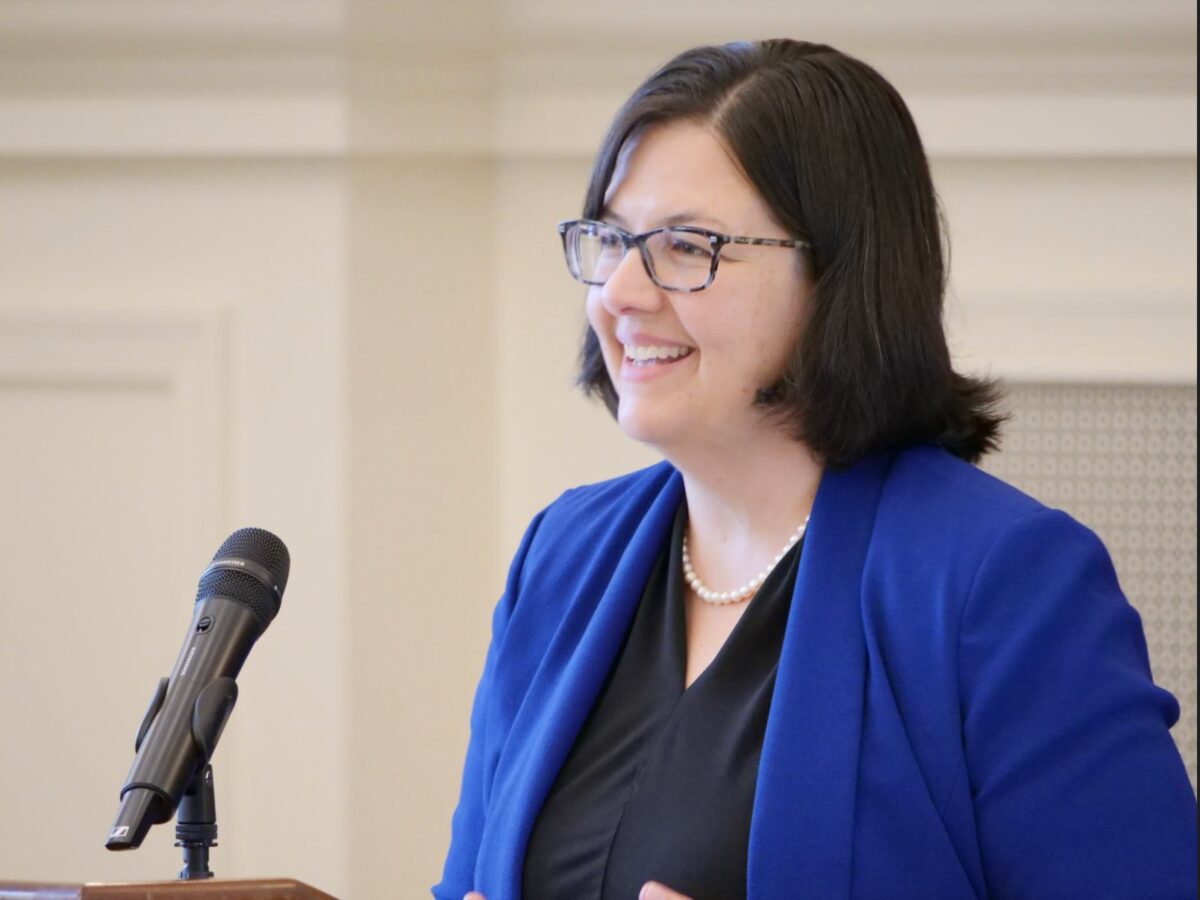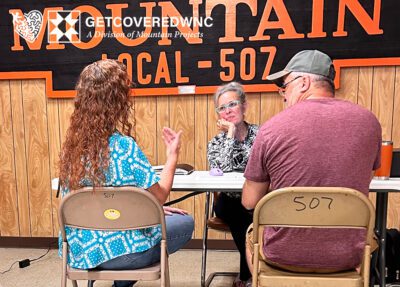

|
|
Editor’s Note: The following is a response to the 2023 Dallas Herring Lecture by Falecia Williams, delivered on Nov. 14, from Shelley White, president of Haywood Community College.
My home is the rural, mountain town of Canton in Haywood County, NC. In comparison to Durham’s population of over 285,000, Canton’s residents number less than 5,000. Earlier this year, the paper mill that is at the center of town unexpectedly announced that it was closing permanently. Over 1,000 jobs ended for a workforce that runs four generations and 115 years deep.
I grew up in a mill village in Caroleen, located in eastern Rutherford County, NC. As a child, my sister and I along with our friends would ride our bikes up and down the checkerboard streets that made up our little town — by all the mill houses that by this time had been passed to the second or third generation. Our church, bank, and post office were all within walking distance from our house. My mom would call us in for supper by ringing the dinner bell out the kitchen door, the unmistakable sound that we better get home. That mill employed hundreds in the area throughout the years including the parents and grandparents of many of our friends. Mill town life was the center of the community.
I was fortunate to be able to stay close to home for my first two years of college, graduating from Isothermal Community College with an Associate of Science degree and transferring to earn my Bachelors. I earned an appreciation for North Carolina community colleges at an early age.
As a graduate student, I landed a position teaching part-time at A-B Tech Community College in Asheville and one of my earliest assignments was working with employees of companies announcing layoffs in the years ahead of the Great Recession. I saw the importance of this work in the eyes of those facing uncertainty and change.
Today the mill in the town where I grew up is closed, and the community that grew up around it is forever impacted by its presence and ultimately by its absence. So, when the announcement was made in March about the Canton mill closing, I reflected on my childhood and also on the hundreds of transitioning workers I’d met years ago. As I remembered their faces moving from despair to relief as new opportunities were opened to them, I knew Haywood Community College was positioned to be a leader of this work to provide hope in the days, months, and years ahead.
Through these experiences — and our college’s response — I want to share with you why I believe the “Rural Response” of our community colleges is so important. Forty-seven of the 58 North Carolina Community Colleges serve rural communities, and this number grows to 260 community colleges when we look nationwide, according to the US Department of Education. Two hundred sixty of you look like me. The Rural Response is our ability to stand strong in times of economic crisis, to meet the needs of our citizens despite unpredictable enrollment and funding challenges. The Rural Response of our community colleges must be immediate, powerful, and well-resourced — for the continued success of our small communities and for the future of our state.
The Rural Response must be immediate
The afternoon that we learned of the mill closure, shockwaves rippled through the entire community — and within a few hours, the response effort was mobilizing. Our college response team convened the next morning and by the end of the week, community leaders and officials from across party lines gathered on our campus including local, regional, state, and federal partners who would band together for the work ahead.
HCC aligned with partners on job fairs and community resource fairs. We participated in the initial Rapid Response meetings with employees, we deployed job seeking and computer access training at the local library. Within days the HCC Foundation announced a new scholarship program, Haywood Strong, with an initial investment of $56,000 to support millworkers, their families, and others impacted by the closing. Within a few weeks HCC announced a slate of summer programs, scheduled to start in the weeks following the closure, including a new CDL program in partnership with Caldwell Community College & Technical Institute. We saw former mill employees register for CDL, Machining, Construction, Public Safety, and Health Care programs — and many others plan for curriculum programs starting in the fall.
Dr. Williams asked if we sometimes underestimate our potential? As small, rural colleges, others may be even more likely to underestimate our potential, but I believe that we are anchors. Anchors for our communities in times of crisis and opportunity. Anchors providing strength and stability in times of change and uncertainty, yet able to move and adapt. We hold steady in the storm and navigate quickly to the people and places who need us most.
The Rural Response is immediate. It is adaptable, flexible; it is local. Our partners and those we are here to serve make up the fabric of our local communities, they are our friends and our neighbors.
The Rural Response is powerful
A thousand jobs, a thousand families, thousands of people impacted across the region. I’ll share with you the stories of a few of those individuals and the powerful impact of a continued ready response in our rural communities.
As I mentioned, part of our response included informational meetings, job, and resource fairs at various locations throughout the county. Ray, a 26-year employee of the mill, was at every event and he expressed to me in April that he was eager for his next chapter to begin and wanted to get his CDL certification. Thanks to Haywood’s partnership with Caldwell CC&TI, less than ten weeks later, Ray walked across the stage at HCC and earned his CDL certification and is already benefiting from these new career skills.
Another former mill employee shared with me that his father was laid off due to a different plant closure in the late 1990s. Over 700 people lost their jobs at that time, and many turned to HCC for training, including his father, who gained a new career because of his community college experience. With a looming separation date and a heavy determination, he said, “If my dad can do it, I know I can do it too.”
Two other employees, Marty and Justin, joined HCC as new team members this year and are bringing their years of experience to help others in our community.
The response of Haywood Community College engaging with our partners helped make these offers of hope possible for Ray and so many others. As HCC prepares to celebrate our 60th anniversary in 2025, we know the impact of our presence, of our continued response, has changed the lives of generations of citizens in Haywood County and beyond. The Rural Response is powerful, because when you improve future opportunities, income potential, career outlook, when you provide hope for one, you change the trajectory of an entire family.
The Rural Response must be well-resourced
Our rural community colleges are leaders within the community; we are economic engines and workforce development powerhouses. We are also the hubs of our communities. Our campus not only serves as “Haywood’s College,” — educating first responders, nurses, early childhood teachers, foresters, construction workers and many others — we also provide a place for community resources and gathering. We operate a 5-star Early Learning Center, hold frequent art exhibits from our professional crafts programs, offer a popular 18-hole disc golf course, and an expanded 3.5-mile hiking trail throughout our beautiful campus arboretum. Every one of our rural colleges serve as anchor institutions for their communities, providing after school clubs, event venues, sports teams, recreation, and the list goes on.
Small rural colleges must be well-equipped to remain ready to respond. How we are equipped today will determine our ability to respond tomorrow. Did I know during the years of the pandemic, as we navigated the challenges of simply operating and managed through declining enrollment and funding, that we would be faced with the largest single plant closure in our region’s history? Of course not. But I knew we needed to remain true to our mission and ready to respond. We worked throughout those years of pandemic uncertainty to safeguard operations, programs, and facilities and carve out resources for new technologies, innovative programs and engagement activities. Despite the challenges faced through the pandemic, HCC was ready to respond.
Our joint partnerships forged in the days following the mill closure led to significant levels of support for our initial and continued recovery efforts. Weekly crisis team meetings led to philanthropic support, including a full-time position at the college to support displaced workers and unrestricted funds to bolster response activities — and these partnerships led to a joint legislative request, successfully resulting in over $60 million in support for county-wide response efforts, including $6 million to HCC for investments in workforce education.
A well-resourced response is critical in times of crisis. Our communities are counting on us to stand in the gap and offer an outstretched hand toward new opportunities.
The Rural Response is critical for our future
Community colleges are the heart of our rural communities, and we are called to meet the changing needs of the community. We are called to be prepared in the best of times and in times of crisis. The Rural Response is critical for our future.
Dr. Williams challenged us to dare to envision a future state that is counterintuitive to our present circumstances. As a community, we are focused on rising above the challenges of the present and past three years — helping workers find jobs and connect with resources to continue navigating this time successfully. We are focused on the future economic health of our region, new jobs, and industry growth in Haywood County. We are all aiming for a brighter future.
For nearly 60 years, Haywood Community College has been an anchor for thousands of students and their families. Nationally, the number of students educated at rural-serving community colleges is 670,000 annually. Our collective Rural Response will continue to have a significant impact. At HCC, we aim to expand our workforce training center to equip continued generations of workers in our community and beyond. We also aim to increase the number of adult learners earning certifications, including CDL Truck Driver Training and many other opportunities leading to sustainable futures.
In the same room where HCC hosted the press conference in March, just days following the announcement of the mill closure, and committed to create short-term programs to support workers in transition — we welcomed students to the first CDL graduation in August. It was a celebration for graduates and their families, but also a celebration of the partnerships and resources, at all levels, to make the program possible. As those dozen graduates stepped forward to receive their new credentials, their path to a new future, I was reminded: this is why we do what we do, this is why we work together for the benefit of our citizens and community. This is the Rural Response.





